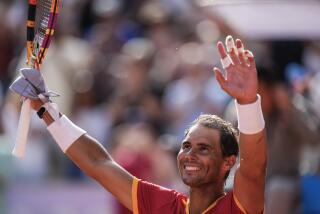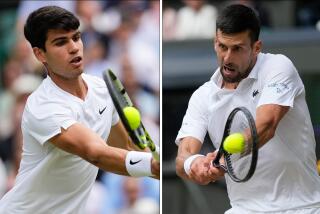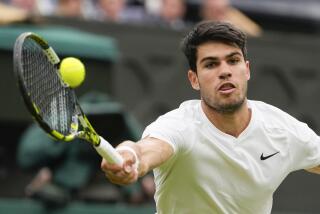Nadal elevates Spanish tennis
- Share via
WIMBLEDON, England -- Next Sunday evening might just bring the All England Club a black swan, a white peacock, a double rainbow, a pink diamond, a July snow, a clean congressman.
When they line up the ball kids and bring out the royals and hand out the men’s singles trophy, a male Spaniard might just take it and hold it aloft, in which case 22-year-old Rafael Nadal from the island of Mallorca would’ve forged a rarity and epitomized a profound U-turn in Wimbledon history.
Since a grand sportsman named Manuel Santana volleyed a Dennis Ralston pass attempt into the open court to clinch the 1966 title, 68 Spanish men have graced Wimbledon singles draws, holding 238 slots. They’ve won no titles, but it’s more the texture of their dearth that makes their path distinctive.
Especially between 1973 and 2001, as 136 Spanish entries scraped to reach four fourth rounds and zero quarterfinals across three decades, the Spanish approach to Wimbledon tilted toward what you might call “cavalier.”
“I think that’s an appropriate word to describe it,” said Patrick McEnroe, the American who played Wimbledon five times, 1991 to ’95.
“They used to go to London for nothing,” Santana said of his countrymen by telephone from Spain.
“The mentality was to rest after the French Open and then come to Wimbledon and not really prepare,” said Albert Costa, who played Wimbledon five scattered times, during a span from 1994 to 2004.
Reared on clay and its slow, high bounces, they reeled on grass and its fast, low bounces. Some cheerily wore out the line, “Grass is for cows.” Sometimes you could spot Parisian red dirt still caked on their sneakers, recalls Luke Jensen, who played 10 Wimbledons in doubles between 1988 and 1998 and added, “And sometimes they didn’t have white clothes, would have to buy them in the pro shop.”
Some who could have played didn’t, as in 1993, when we learned the French Open champion wouldn’t play, his mother having said he needed rest. With 85 first-round exits between 1973 and 2001, they often came to play a round, get a smallish paycheck and skedaddle to Heathrow. None asked Santana for advice, he said, and he’s too gentlemanly to bark it unsolicited.
If you drew a Spanish player, as McEnroe did in 1991, “You were feeling really good about your chances,” he said. “That was a really good draw . . . It certainly was understood in the locker room that they were up against it.”
So then, the 21st century: 14 fourth-rounders in the last seven Wimbledons; the first male quarterfinalist since 1972 in 2005 with Feliciano Lopez (an actual serve-and-volleyer); entries at 16, 13, 14, 14 and 12 the last five years, far from the zero of 1977-78 or one of 1984-85; Nadal, the first Spanish finalist since Santana in 2006 (and then again in 2007); Nadal and Juan Carlos Ferrero as two Spanish quarterfinalists in 2007, a first; Nadal, Lopez and Fernando Verdasco as three Spanish fourth-rounders in 2008, a first.
So then, a question: What in the name of Manuel Orantes has happened? “I had this question every day this week,” Verdasco said.
For one clue, observe the Wimbledon baselines, which took about two days to die of trampling and turn brown, the whole world having opted to reside at the baseline. For another, hear the soundtrack of Wimbledon 2008, one player after another testifying that the courts have slowed across time. For a historic marker, Jensen stresses, remember 1990, when a rankings-system overhaul eased the penalty for one bad tournament by counting only a guy’s best 14 per year, prompting the first spike in number-of-Spaniards.
For a final hint, many say, sprinkle in some muscular Mallorcan charisma.
“Do you know what?” Santana said. “The guy who changed the whole thing is Rafa. Because he has been talking since he was 17 or 16, because in his mind or in his dreams, he will win Wimbledon, OK? . . . The other guys, they seem like if Rafa goes there, why don’t we try?”
“Rafa actually has been able to change the mentality around the Spanish players, because he’s showing them that it is possible to play well with an aggressive baseline game,” said the five-time defending champion Roger Federer.
Said Nadal, who’s in the fourth round: “If you want to be a big player, important player, you want to be in the top positions, well, is impossible” to skip an event like this. “So,” he added, “Wimbledon was very important in my mind always.”
It’s a whole bale of contagion that has deepened a redefinition with slower grass lending cooperation. Noting fellow left-hander Lopez’s quarterfinal in 2005, Verdasco said, “That makes to have confidence, no?” Stating the tone of the era, Verdasco said, “I think this new generation of players, we want to play well on all courts.”
So while Nadal might give Centre Court a rare and stylish sight come Sunday, another gauge of the age played Court No. 18 last Saturday.
There, coach Costa, the 2002 French Open champion who didn’t play Wimbledon that year, watched his pupil, Lopez, reach the fourth round for the fourth time. Then Costa walked back toward the players’ area, citing Wimbledon’s slower conditions and dabbling in regret.
“If I could have back the time,” he said.
--
(BEGIN TEXT OF INFOBOX)
Wimbledon
A look at some of today’s featured matches, with the world rankings in parentheses:
What’s next
* Venus Williams (7) vs. Alisa Kleybanova, Russia (42) -- It’s the four-time and defending champion against one of six Russian women in the last 16. It’s one of the last stands before Russians make up the entire top 50.
* Serena Williams (6) vs. Bethanie Mattek (69) -- Following Venus Williams on Court No. 2, a bit of a fashion bowl. In that sense, two winners.
* Roger Federer, Switzerland (1), vs. Lleyton Hewitt, Australia (27) -- When Hewitt won here in 2002, he seemed a grim churl. When these guys stay around long enough, though, we just start to call them great fighters.
* Rafael Nadal, Spain (2), vs. Mikhail Youzhny, Russia (17) -- Youzhny played a dramatic five-set thing against Radek Stepanek on Saturday. The forecast today calls for less drama.
* Marat Safin, Russia (75), vs. Stanislas Wawrinka, Switzerland (9) -- The forecast today calls for great fun.
* Nadia Petrova, Russia (18), vs. Alla Kudryavtseva, Russia (154) -- Two Russian women play each other. Of course, someday that’ll be every match.
-- Chuck Culpepper
More to Read
Go beyond the scoreboard
Get the latest on L.A.'s teams in the daily Sports Report newsletter.
You may occasionally receive promotional content from the Los Angeles Times.










